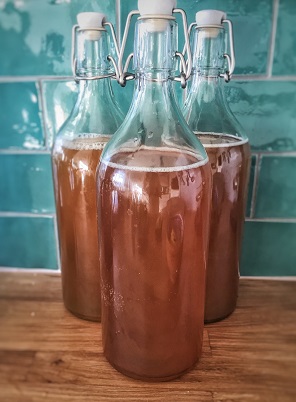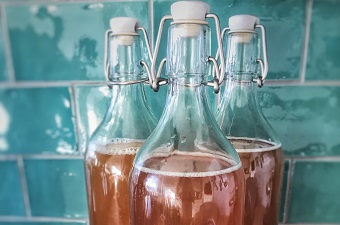Why is kombucha all the rage?
Browse the organic aisle of most grocery stores and you will likely find a shelf of bottled kombucha drinks touting promising claims of nutritional benefits. These colored teas have become synonymous with health and prosperity and are often consumed by college students looking for a cleansing elixir or a healthy boost.
Kombucha is a fermented tea created by adding yeast, bacteria and sugar to black tea. Although this drink has been around for centuries, it has recently become extremely popular in the United States. Kombucha consumption in the US started as a trend, but it grew into a mainstream sensation.
Kombucha sales have skyrocketed in the past several years — Grand View Research predicts that U.S. sales will hit $4.46 billion by 2024. But it’s probably not due to the taste. It has been largely described as tasting like sour apple vinegar, a flavor that doesn’t sound appealing to most.
No, the majority of kombucha drinkers consume it solely because they believe it to be of immense nutritional value. There are countless fantastical claims about what kombucha can do, ranging from lowering blood pressure and thickening hair to preventing and even curing diseases like arthritis and cancer. It may sound far-fetched, but these claims are largely the reason why the concoction keeps flying off the shelves.
This perception of kombucha is probably due to its mystical past which, according to Seeds of Health, dates all the way back to China in 221 BC. There, it was referred to as “The Tea of Immortality.” The Chinese praised it for its healing properties.
Despite this reputation, science has shown that the reality is far less exciting. The majority of its surrounding claims are not supported by solid medical research.

“Kombucha does have potentially beneficial components, but people are jumping to conclusions without any scientific support,” SDFC Dietician Jenna Heller explained.
So, there is no research to indicate that consuming the drink will actually detoxify your body or prevent you from getting diseases. However, devoted kombucha fans shouldn’t be too disappointed. Though kombucha does not greatly affect your body, there are some scientifically supported benefits to drinking it.
Kombucha is filled with live, healthy bacteria called probiotics. According to the National Institutes of Health, probiotics aid in digestion and can even strengthen the immune system. They have been known to regulate mood and stress levels as well, though no significant psychological effects have been proven.
Kombucha can also serve as a good alternative to other beverages. Heller says that consuming kombucha is less harmful than soda and juices due to the fact that it “contains a lower sugar content than most other drinks.”
Still, it is important to take caution with kombucha, as it contains alcohol due to the fermentation process. Though the alcohol content of the drinks sold in stores is low enough to be classified as non-alcoholic, those who are susceptible to alcohol dependency or have special circumstances such as pregnancy should exercise caution.
In addition, due to the beverage’s acidity, Heller warns that it should not be consumed in excess.
“With foods and drinks that are acidic, people can start to feel negative effects such as weakened teeth enamel or an increased acid reflux if they drink too much,” Heller said.
Overall, research into kombucha’s health benefits is fairly limited. While it is an alternative to soda and juices, kombucha drinkers shouldn’t expect any significant health benefits. Perhaps the hipsters may have missed the mark a bit with this one.
